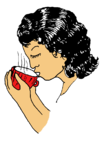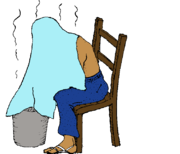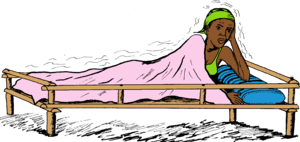Hesperian Health Guides
COVID-19: Caring for a sick person
Contents
Many people with COVID-19 have a mild illness, like a cold or flu, with some of these signs: fever, chills, dry cough, tiredness and weakness, not wanting to eat, muscle or joint pain, sore throat, stuffy nose or headache. Sometimes there is diarrhea or vomiting. Unless danger signs develop, rest, fluids and care at home are all that the person needs.
Usually with coronavirus, signs of illness begin 3 to 5 days after infection, and serious problems may appear after 2 to 7 days of milder illness. The illness may last for 2 or 3 weeks. It may take longer to get all your energy back.

To care at home for someone who may have coronavirus, the main things needed are rest and sleep, drinking a lot of water, teas and broth to loosen congestion and avoid dehydration, and paracetamol or aspirin to lower fever. If the person can eat, give simple, healthy foods. Antibiotics will not cure coronavirus because they work against bacteria, not viruses. Keep the person separate from the rest of the family as much as possible, to prevent the virus from spreading.
To help with specific problems:

Fever: Fever up to about 101° F or 38° C is a sign the body is fighting infection. Use cool cloths for feeling too hot, or a blanket for chills. Use paracetamol (acetaminophen) for discomfort or to lower fever. For an adult, give 1000 mg every 6 hours. Do not give more than 4000 mg per day.
Cough: Coughing is a way your body tries to get rid of infection. Cough medicines do not cure a cough, and are best avoided. Gargling with warm salt water several times a day may help. Breathing steam in a hot bath, with a humidifier, or by covering your head with a towel over a pan of hot water may help.
Chest pain: A heating pad or a hot compress (cloth dipped in hot water and then wrung out) on your chest may lessen pain.
Aches and pains: Take paracetamol (acetaminophen) for pain (same dose as for fever), especially if pain keeps you from resting or sleeping.
For difficulty breathing: Breathing steam (see cough, above) and drinking warm fluids may help lessen mucus in the lungs and help open airways. The caffeine in a cup of coffee or black tea may also help. Don’t smoke or be around smoke, including from other people smoking or smoke from wood or trash fires.
To protect others in the household from becoming infected:
- The sick person should rest and sleep in a separate room if possible. If not, they should use a separate bed and stay away from spaces shared with others. Stay at least 1 meter away from the sick person. Everyone in the household should wash their hands often with soap and water.
- The sick person should wear a face mask as much as possible, to keep respiratory fluids from spreading through breathing, talking, sneezing, or coughing.
- The sick person should eat and drink alone, not with the rest of the household. He should have his own dishes and utensils, which should be washed with soap after each use.
- If possible, one person should be the caregiver. The caregiver should use a mask while caring for the sick person and carefully wash their hands after providing care. Change and wash face masks often. Caregivers should wear gloves when touching body fluids. Reusable gloves can be cleaned with soap and water. Always wash hands after removing a mask or gloves.
- Without letting it touch your clothes or skin, put a sick person’s laundry in a bag and close it until it will be washed. Wash clothes, bed linen, towels, and masks with regular laundry soap and in hot water if it is available. Dry the clean laundry in the sun or in a dryer.
- Disposable gloves, masks, protective clothing or used cleaning supplies should be kept in the sick person’s room in a covered bin until their safe disposal. Touching this waste can spread illness.
- Once or twice a day, clean and disinfect surfaces and objects in the sick person’s room that are touched often. Remember to clean the doorknobs, light switches, and the bathroom the sick person and the caregiver use.
- Keep windows open in shared spaces as well as in the sick person’s room. Fresh air can reduce the amount of virus in the air.
Related Links



